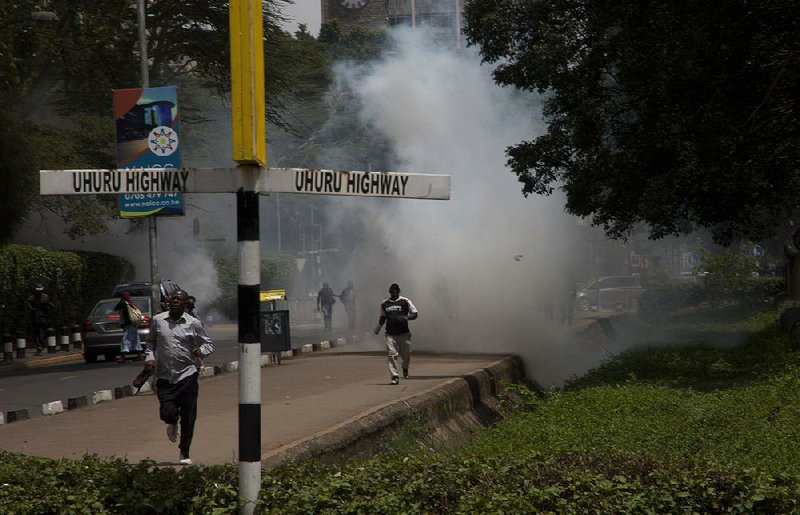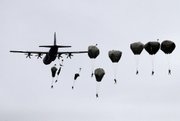5 Kenyans die as police, marchers clash
NAIROBI, Kenya — At least five people were killed Friday in confrontations between Kenyan police and supporters of opposition leader Raila Odinga as tensions over the disputed presidential election continued.
Police fired live rounds and tear gas to prevent Odinga’s convoy from making its way from the airport to Nairobi’s main park so he could address supporters after returning from overseas.
Police warned earlier this week that they would not allow a ceremony to welcome Odinga back from speaking engagements abroad. Opposition legislators had urged supporters to turn out in numbers “more than 1 million strong.”
Police said five people were killed by mobs that stoned them to death when they were caught stealing during the confrontations. But mortuary attendants and eyewitnesses said police shot them.
Odinga had been speaking in the United States and Britain about Kenya’s political turmoil. Odinga, whose claim of electoral fraud led the Supreme Court to nullify President Uhuru Kenyatta’s re-election in August, boycotted the new vote, saying changes had not been made.
Kenyatta’s win last month is being challenged at the Supreme Court. The court will make a decision Monday.
New cholera risk seen for Yemen cities
SANAA, Yemen — One million people across three Yemeni cities are at risk of a renewed cholera outbreak and other water-borne diseases after the closing of airports and seaports by a Saudi-led coalition fighting Yemen’s Shiite rebels, an international aid group said Friday.
The International Committee of the Red Cross said in a statement that the cities of Hodeida, Saada and Taiz were not able to provide clean water in recent days during a fuel shortage.
“Close to 1 million people are now deprived of clean water and sanitation in crowded urban environments in a country slowly emerging from the worst cholera outbreak in modern times,” said Alexander Faite, head of the Red Cross delegation in the war-ravaged nation.
The Red Cross said other major urban cities, including the capital, Sanaa, will find themselves in the same situation in less than two weeks unless imports of essential goods resume immediately.
Pakistanis say raid killed top militant
ISLAMABAD — Pakistan’s military said security forces killed a Baluch separatist commander involved in this week’s slaying of 15 men in southwestern Baluchistan province as they were trying to cross into Iran on their way to Europe.
The raid was carried out not far from where the 15 were killed Wednesday in the Turbat district, the military said. The victims all were from the populous Punjab province.
The slain commander was identified as Younas Taukali of the separatist Baluchistan Liberation Front.
Taukali’s group claimed responsibility for Wednesday’s attack, saying the slain men were working on a road project for Pakistan's army.
For years, separatist groups have waged a low-level insurgency in Baluchistan, demanding a fairer share of the province’s resources, but Islamic militant groups also have been active there.
Russia glares as U.S., Serbia hold drills
BELGRADE, Serbia — American and Serbian paratroopers held joint military exercises Friday in Serbia, watched with unease by Russia, which is trying to increase its influence in the Balkans and keep the country within its fold.
Serbian President Aleksandar Vucic attended the last day of the four-day drill that included joint jumps by Serbian and U.S. parachutists from two U.S. Air Force C-130J Hercules transport planes that flew close to the Serbian capital, Belgrade.
“The joint exercise contributes to the [military] skills, but also enhances partnership and friendship that was not always seen in the past,” Vucic said, adding that he is “grateful to our American partners.”
In 1999, a 78-day, U.S.-led NATO bombardment ended a Serbian crackdown against ethnic Albanian separatists in its former province of Kosovo, making the Western military alliance unpopular among the Serbs.
American and NATO-related military drills in the Balkans regularly anger the Kremlin, which opposes NATO’s expansion in the former communist eastern Europe.


